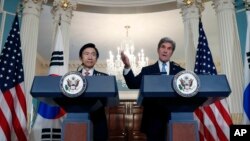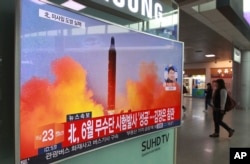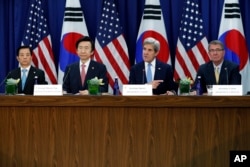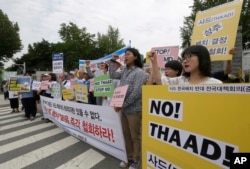The United States and South Korea on Wednesday announced a further strengthening of their security alliance with the start of talks on an "extended deterrence" against a nuclear North Korea.
The U.S. is considering the permanent deployment at its bases in South Korea of B-1B and nuclear capable B-52 bombers, F-22 stealth fighter jets and nuclear-powered submarines, according to defense and diplomatic sources.
Wednesday's establishment of a high-level Extended Deterrence Strategy and Consultation Group is being accompanied by unusually blunt public comments from the U.S. secretaries of defense and state about the possibility of nuclear war initiated by Pyongyang on the Korean peninsula.
"Any use of nuclear weapons will be met with an overwhelming and effective response," said U.S. Secretary of Defense Ash Carter at the start of security talks with the South Korean defense and foreign ministers.
South Korea's security is guaranteed by the "full spectrum of U.S. defense capabilities," Carter said in a reference to the American nuclear defense shield protecting the U.S. ally.
‘Dagger against our throats’
Carter made his comments while seated alongside U.S. Secretary of State John Kerry and two South Korean government officials — Minister of National Defense Han Min-koo and Minister of Foreign Affairs Yun Byung-se.
Hours later, Kerry, at a news conference with Yun, repeated the same stark rhetoric and predicted "North Korea will never attain its goals through threats and intimidation."
Yun, at the start of the talks, said Pyongyang is nearing the "final stage of nuclear weaponization," compelling the United States and South Korea to utilize "all tools in the toolkit" to defend themselves and make the North Koreans "feel the panic under their skins."
Han then said that North Korea's nuclear weapons and missiles are akin to "a dagger against our throats."
THAAD deployment
Rounds of UN-led sanctions have done little to deter North Korea from additional provocative nuclear and missile tests.
While continuing to work for denuclearization, "we need to ensure working together that the DPRK pays a price for its dangerous actions," Kerry said, using an acronym for the Democratic People's Republic of Korea.
Amid what he termed a "pivotal moment" on the Korean peninsula, Kerry added that the United States will deploy to South Korea "as soon as possible" a Terminal High-Altitude Area Defense (THAAD) battery.
China and some in South Korea oppose the deployment of the anti-ballistic missile system, contending it unnecessarily exacerbates tensions in the region.
North Korea has conducted five nuclear tests — its most powerful yet just weeks ago. And its latest ballistic missile launch, deemed a failure by international observers, occurred just days ago.
Kerry maintained that the military option to stop North Korea's ongoing nuclear weapons and ballistic missile programs is "a last resort."
Analysts’ reactions
Wednesday's tougher language from top U.S. officials caught some by surprise, but it will be welcomed by hawks who argue that diplomacy and economic sanctions have failed to deter Pyongyang.
"I don't think this stronger rhetoric is going to deter them from taking the next step, whatever their next step is," said Pacific Forum CSIS adjunct fellow Tara O, the author of "The Collapse of North Korea: Challenges, Planning and Geopolitics of Unification."
Other analysts question the prospect of basing U.S. Air Force bombers in South Korea.
"I don't see why you need B-52s and B-1s on the peninsula. That puts them within DPRK short-range missiles, and therefore more vulnerable than if they remain at Andersen [Air Force Base on Guam]. They can fly to Korea in a few hours," said Troy University international relations professor Daniel Pinkston, author of "The North Korean Ballistic Missile Program."
Basing such aircraft and THAAD on the Korean peninsula would cause China "to be in an uproar" and officials in Pyongyang and Beijing to assert that such forward deployed assets are intended to deter the Chinese, Pinkston told VOA.
Carter's stark reference Wednesday to nuclear retaliation is expected to raise serious questions about the nuclear option, said O, a retired U.S. Air Force lieutenant colonel who did three tours of duty on the Korean peninsula and also specialized in regional security matters at the Pentagon.
"Someone has to make a decision on what will be an acceptable cost if we are to carry out anything beyond rhetoric," O told VOA.
The two Koreas have no diplomatic ties and have technically remained at war since a devastating 3-year conflict in the early 1950s ended in a stalemate. The Korean War drew in Chinese forces supporting the North, while a U.S.-led United Nations coalition countered the North's invasion of the South.








